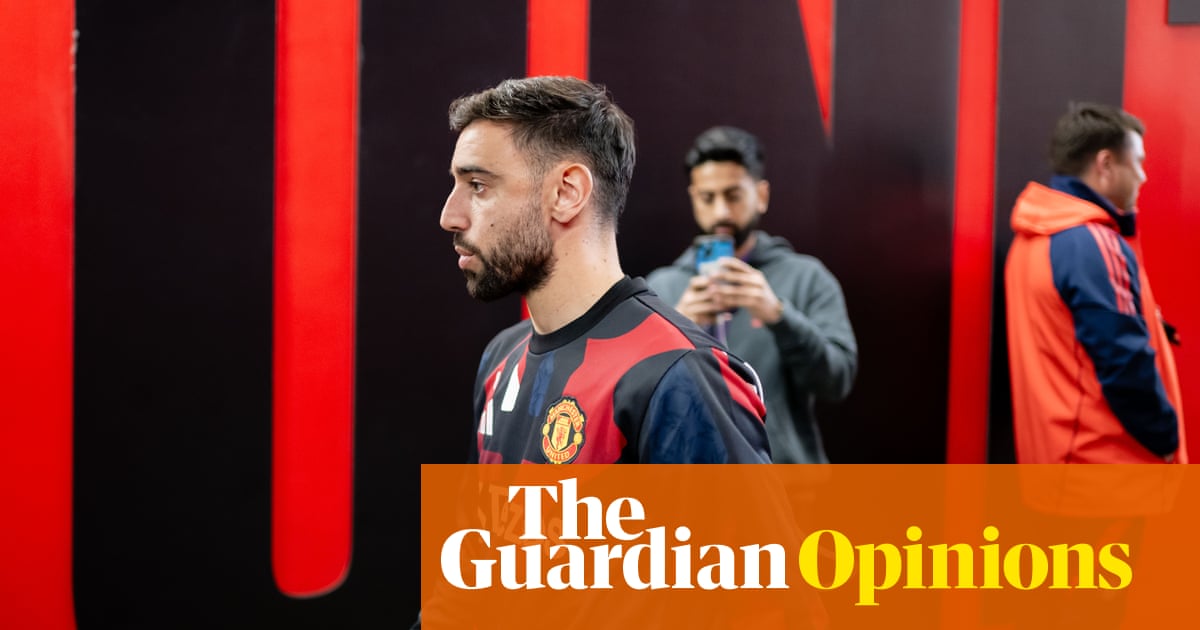In publicly rejecting the overtures of the Saudi Pro League, Bruno Fernandes has made it clear hewants to continue playing football at the highest level. That he wants to challenge for trophies. That he has no interest in wasting what remains of his peak years jogging around aimlessly in the service of a vast public relations project, providing lucrative content for a cruel and heartless regime. Despite all this, he’s more than happy to remain at Manchester United for now.
There were other angles to this decision. In a sense, Al-Hilal’s courtship of Fernandes represented a kind of catch-22 for United, desperate to reinforce their underperforming squad while remaining compliant with profitability and sustainability rules. Only a player who truly loved United could contemplate leaving in order to help balance the books. But in signalling his willingness to leave, Fernandes merely demonstrated why United could not possibly let him go.
Here, after all, is a player who has firmly established himself as one of the best midfielders in the world while playing for a team that has just finished 15th in the league, who so clearly adores this club and its people more than its parasitic owners ever will. But in this market everything has its price and for Al-Hilal – under the new management of Simone Inzaghi – that price was reported to be £100m in fees and around £50m a year in wages.
Selling Fernandes would have been the easy way out for United: a huge fee for a 30-year-old on massive wages, which could then be reinvested in the rest of the squad. As it is, Fernandes will probably have to be accommodated – tactically and financially – alongside United’s two forward signings:Matheus Cunha from Wolvesand Bryan Mbeumo,who is in the process of being acquired from Brentford. How might Ruben Amorim blend these three richly gifted talents? And what trade-offs will need to be made in the process?
The first statistic that jumps out is that Cunha and Mbeumo were first and third for xG overperformance in the 2024-25 Premier League season. To put it in lay terms: they scored 35 goals between them, whereas the average player presented with exactly the same chances would be expected to score 20.9 goals. So are these elite finishers? Well, neither player has remotely outperformed their xG to a similar extent before, which suggests their goal haul is more the result of temporary luck than sustainable class.
In short: if United are signing Cunha or Mbeumo in expectation of a reliable 20-goal striker, they are likely to be disappointed. Mbeumo’s strength, historically, has been as a creative attacker rather than a pure target man: a link between midfield and attack, quick feet in the penalty area, a dainty dink to the back post. Interestingly, while he has outperformed his expected goals he has underperformed his expected assists for the first time. Mbeumo makes perfect sense as a foil for a deadlier finisher such as Yoane Wissa or Ivan Toney or Vincent Aboubakar with Cameroon. But he is not necessarily that deadly finisher himself.
Cunha, for all his undoubted technical gifts and spectacular interventions for Wolves, fits the profile of an attacking midfielder more than a pure striker. He is at his most comfortable picking the ball up 40 yards out, combining with others, playing the killer through ball or shooting early from long range. Of all the players who have scored more than six goals in the Premier League season, only two – on average – took their shots from further out. One was Eberechi Eze. The other was Fernandes.
What, then, is the wider strategy? Is it to convert the 5ft 7in Mbeumo into a No 9? Is it to provide the perfect platform for Rasmus Højlund? Is it to build a more fluid attacking model in which the front three in Amorim’s 3-4-3 can freely interchange and shift the point of attack, a system that somehow harnesses Mbeumo’s physicality and Cunha’s link play and both men’s ability to progress the ball in the opposition half? And if so, how does it respond against teams that do not allow United the space to transition and run from deep against them?
Sign up toFootball Daily
Kick off your evenings with the Guardian's take on the world of football
after newsletter promotion
Perhaps we will not know for sure until United line up in pre-season. Perhaps further signings will clarify the strategy. Perhaps in time United will come to resemble their 2020-21 iteration under Ole Gunnar Solskjær; a side largely set up on the transition, built around the pace of Marcus Rashford, Mason Greenwood and Anthony Martial, when Fernandes enjoyed the most singularly destructive season of his career.
But all of this requires a certain leap of faith. Faith in the ability of Mbeumo and Cunha to continue their upward trajectory, to thrive in new more claustrophobic environments. Faith in the ability of Fernandes to adapt to what is likely to be a deeper and more disciplined role, with less scope for roaming all over the pitch. Faith in the United hierarchy to balance the books, to make the necessary sales in a market where everyone knows United have to sell.
Above all it requires a faith in Amorim. To find the solutions that have been so scarce thus far. To be the coach United hired rather than the guy every United coach seems to become in the end: tired, jaded, fearful, resentful, a punchline pursued by viral Gary Neville clips.
United’s age of dominance has gone. Their financial impregnability has gone. Their cash reserves have gone. Their swagger, their dignity, their proud sense of exceptionalism: all gone. In a way, blind faith may be all the modern United has left.
